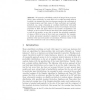Free Online Productivity Tools
i2Speak
i2Symbol
i2OCR
iTex2Img
iWeb2Print
iWeb2Shot
i2Type
iPdf2Split
iPdf2Merge
i2Bopomofo
i2Arabic
i2Style
i2Image
i2PDF
iLatex2Rtf
Sci2ools
125
click to vote
MP
2007
2007
Smoothed analysis of integer programming
We present a probabilistic analysis of integer linear programs (ILPs). More specifically, we study ILPs in a so-called smoothed analysis in which it is assumed that first an adversary specifies the coefficients of an integer program and then (some of) these coefficients are randomly perturbed, e.g., using a Gaussian or a uniform distribution with small standard deviation. In this probabilistic model, we investigate structural properties of ILPs and apply them to the analysis of algorithms. For example, we prove a lower bound on the slack of the optimal solution. As a result of our analysis, we are able to specify the smoothed complexity of classes of ILPs in terms of their worst case complexity. For example, we obtain polynomial smoothed complexity for packing and covering problems with any fixed number of constraints. Previous results of this kind were restricted to the case of binary programs.
Related Content
| Added | 27 Dec 2010 |
| Updated | 27 Dec 2010 |
| Type | Journal |
| Year | 2007 |
| Where | MP |
| Authors | Heiko Röglin, Berthold Vöcking |
Comments (0)

